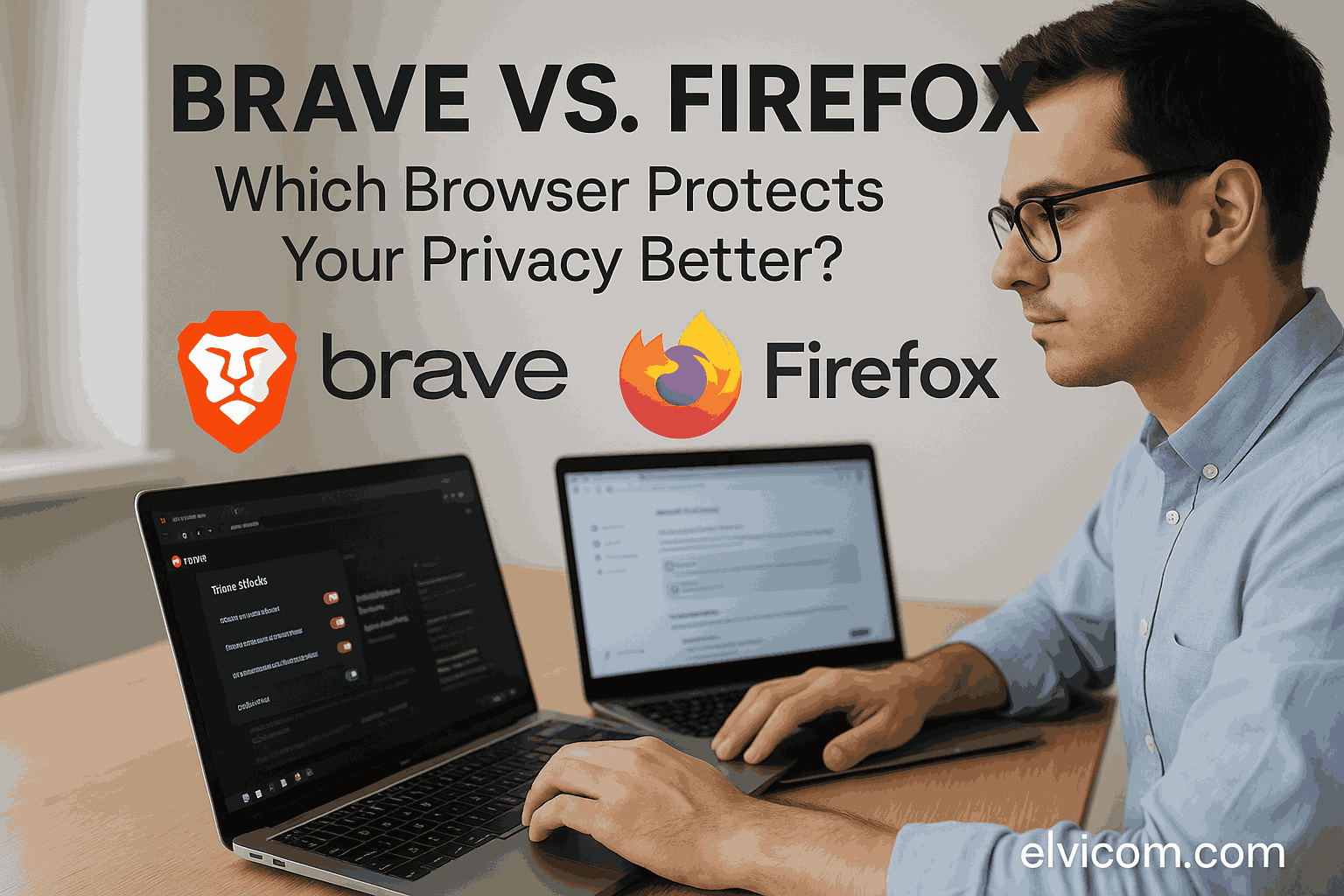
If you’re serious about digital privacy, you’ve likely heard of two top contenders: Brave and Firefox. Both promise to block trackers, shield your identity, and provide a cleaner, more secure browsing experience. But in 2025, which browser truly gives you the best privacy protection—and why?
In this guide, we compare Brave and Firefox across the features that matter most to privacy-conscious users: tracking protection, fingerprinting defense, data transparency, performance, and open-source credibility.
Let’s find out which browser you should trust with your online life.
1. Default Privacy Protections
Brave blocks ads, third-party trackers, and fingerprinting by default. Its “Shields” system shows you exactly what’s being blocked on each site. It also upgrades all connections to HTTPS automatically.
Firefox blocks many third-party cookies and trackers by default with its Enhanced Tracking Protection. However, fingerprinting and some crypto-miners may still need to be blocked manually unless you enable “Strict Mode.”
Winner: Brave – Stronger out-of-the-box privacy settings.
2. Fingerprinting Defense
Brave includes anti-fingerprinting protection by default. It randomizes canvas elements and limits fingerprintable APIs, making you harder to uniquely identify across websites.
Firefox includes partial fingerprinting protection, but it’s not fully enabled unless you dive into about:config. Mozilla is developing resistance tools, but they’re still catching up.
Winner: Brave – More aggressive anti-fingerprinting without extra configuration.
3. Tracker Blocking
Brave uses its own blocklists and AI-enhanced tracker prevention to stop:
- Facebook/Google login trackers
- Cross-site cookies
- Pixel and script-based trackers
You can view real-time blocking stats in the browser.
Firefox blocks social media trackers and common analytics scripts, especially in Strict Mode. It also uses smart blocklists and supports Global Privacy Control (GPC).
Draw – Both perform well, but Brave shows it more transparently.
4. Speed and Performance
Because it blocks ads and trackers by default, Brave loads pages up to 3x faster than Chrome. It uses the Chromium engine, so it supports all Chrome extensions.
Firefox Quantum is fast but can lag slightly behind Chromium in performance benchmarks. However, it’s less resource-hungry than Chrome or Edge.
Winner: Brave – Faster due to native ad-blocking and Chromium base.
5. Open Source and Community Trust
Brave is fully open-source, but the company does monetize via Brave Ads (opt-in), and some critics raise concerns about its crypto wallet integrations (BAT tokens).
Firefox is developed by the nonprofit Mozilla Foundation, fully open-source and ad-free. It doesn’t include cryptocurrency incentives and is funded by partnerships.
Winner: Firefox – More community trust and nonprofit backing.
6. Extension Support
Brave supports all Chrome Web Store extensions thanks to its Chromium base.
Firefox supports Firefox Add-ons, which are independently reviewed and tend to be more privacy-vetted.
Draw – Brave has broader support; Firefox has curated privacy options.
7. Mobile Privacy
Brave Mobile includes ad-blocking, HTTPS upgrade, private search, and Brave Rewards. Fast and lightweight.
Firefox Focus (Mobile) is a minimalist version with instant tracker blocking and auto-history deletion. Firefox for Android also supports extensions.
Winner: Firefox – Better mobile privacy with Firefox Focus.
Comparison Table: Brave vs. Firefox (Privacy Features in 2025)
| Feature | Brave | Firefox |
|---|---|---|
| Default Ad/Tracker Blocking | ✅ Strong | ✅ Moderate |
| Fingerprinting Protection | ✅ Built-in | ⚠️ Manual Setup |
| HTTPS Everywhere | ✅ Yes | ✅ Yes |
| Open Source | ✅ Yes | ✅ Yes |
| Based on Chromium? | ✅ Yes | ❌ (Gecko) |
| Built-in VPN Option | ❌ No | ✅ (Mozilla VPN) |
| Accepts Crypto/Ads | ✅ Opt-in Ads | ❌ No ads |
| Private Mobile Experience | ✅ Good | ✅ Excellent |
Bar Chart: User Privacy Rating (2025 Community Survey – U.S. Users)
| Browser | Privacy Rating (Out of 10) |
|---|---|
| Brave | 9.3 |
| Firefox | 8.9 |
| Chrome | 4.2 |
| Safari | 6.8 |
| Edge | 3.7 |
Brave edges out Firefox slightly due to stronger defaults and built-in protections.
Where Brave Wins
Better default blocking and anti-fingerprinting
Faster performance thanks to ad blocking
Clean, built-in crypto tools for those who want it
Transparent Shields dashboard
Where Firefox Wins
Backed by a nonprofit with no ad network
More open-source credibility
Firefox Focus for extreme mobile privacy
No engagement in tokenization or ad reward systems
FAQs
Q: Is Brave better than Firefox for beginners?
Yes. Brave offers strong privacy without needing manual setup, while Firefox requires tweaking to reach similar levels.
Q: Does Brave sell your data through Brave Ads?
No. Brave Ads are opt-in and fully anonymized. You get rewarded with BAT tokens for viewing them—but participation is optional.
Q: Can I use both browsers?
Absolutely. Many users run Brave for everyday browsing and Firefox for specific secure tasks or research.
Q: Which is better for TOR browsing?
Firefox integrates with the Tor Browser more directly, although Brave includes a “New Private Window with Tor” option too.
Final Verdict
If you want a plug-and-play private browser that blocks almost everything without lifting a finger, Brave is the stronger option in 2025. Its aggressive default settings, speed, and privacy dashboards make it ideal for users who want fast, private browsing with minimal effort.
But if you care deeply about transparency, nonprofit values, and customizable privacy—Firefox remains a worthy choice, especially when configured properly.
Bottom line:
Choose Brave for fast, private browsing with strong defaults
Choose Firefox for community-backed, open-source browsing with deep customization
Hashtags:
#BraveBrowser #FirefoxPrivacy #PrivacyBrowser2025 #Elvicom #OnlinePrivacy
Website: https://elvicom.com